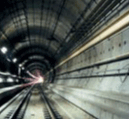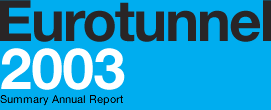
Eurotunnel manages the infrastructure of the Channel Tunnel and operates accompanied truck shuttle and passenger shuttle (car and coach) services between Folkestone, UK and Calais/Coquelles, France. It is market leader for cross-Channel travel. Eurotunnel also earns toll revenue from other train operators (Eurostar for rail passengers, and EWS and SNCF for rail freight) which use the Tunnel. Eurotunnel is quoted on the stock markets in London, Paris and Brussels.
Strategy unfolding
A difficult environment
Having made good progress until 2002, the Group was hard hit in 2003 by the economic climate and the international political situation, which were particularly unfavourable to the tourism and transport sectors. The ferries, faced with a depressed market and excess capacity, adopted a pricing policy that impacted on average market yields and therefore on the income generated by our primary shuttle business. This more than cancelled out the increased volumes on our truck shuttle service.
In spite of this difficult environment, the outstanding quality of our services enabled us to strengthen our position in the market. The sustained effort we have put into increasing productivity allowed us to hold operating costs stable. We were therefore able to limit the reduction in operating profit to 18%, which at £170 million is still at a very profitable 30% of our operating revenues of £566 million (down 5%).
The net loss before impairment charge is limited to £34 million thanks to an exceptional profit of £115 million from financial operations. We have recorded an impairment charge of £1,300 million as explained in the financial analysis. This impairment charge does not impact on the Group's cash position or loan agreements, and reduces the annual depreciation charge by approximately £17 million from 2004.
During the year, we reduced our debt by a further £155 million, bringing the total reduction of debt since the financial restructuring of 1998 to £1.2 billion. The average interest rate, at 4.9%, is very low and no loans fall due before 2006.
Although commentators are increasingly more optimistic about the overall economic prospects for 2004, there are still no signs of improvement in the cross-Channel market. The market remains depressed and price competition is fierce. At this point it is therefore difficult to predict when our shuttle business will pick up again.
Strategic progress
At the last Annual General Meetings, we presented three new strategic directions for the next few years to reinforce the existing strategy of developing shuttle revenues, controlling costs and reducing debt. The new strategic initiatives focused on becoming a driving force for rail freight development, acting as a dynamic partner in regional development, and instigating proposals to restructure the cross-Channel rail industry.
We made considerable progress in all three areas in 2003.
As far as rail freight is concerned, our operator's licence will enable us to launch a new cross-Channel service. From early 2005, Eurotunnel will be able to run trains between Basle in Switzerland and Dollands Moor near Ashford in Kent. This is the key sector of the freight corridor linking Milan, Basle, Metz (for connections to Germany and Eastern Europe), Dourges (near Lille) and the industrial and commercial centres of the United Kingdom. Several potential customers have already shown their interest in this service. In addition, we are starting construction of an intermodal freight platform at our Folkestone terminal, which will for the first time allow standard Continental gauge goods trains to access the British market. This new terminal should be operational by 2005; this will then be the only point of entry to the United Kingdom for Continental wagons of this gauge. If the traffic resulting from these two projects develops as we envisage, we can expect the contribution of our rail freight business to double. Moreover, these new services should spark off interest in cross-Channel rail freight and encourage other operators to use the Tunnel.
As an active partner in regional development, we are working with local authorities to promote and implement all the economic, cultural and tourist-related initiatives that are likely to increase the attractiveness of Kent and the Nord-Pas-de-Calais and therefore, in the long term, increase use of the Tunnel.
Finally, the most important part of our strategy consists in finding solutions to the structural problems facing the cross-Channel rail industry. Eurotunnel announced Galaxie Project on February 9 simultaneously with its 2003 annual results.
Galaxie Project
Eurotunnel has made proposals to the UK and French Governments and its industry partners which seek to address the structural problems faced by the cross-Channel rail industry.
The cross-Channel rail industry currently suffers from under-utilisation of expensive infrastructure, financial losses and conflicting contractual relationships. In particular the high level of access charges paid by rail companies for the use of the Channel Tunnel is holding back traffic growth. Eurotunnel's current financial structure leaves it with no scope to reduce these charges unilaterally.
Eurotunnel has conducted a detailed analysis of the industry for over a year in order to identify solutions for the complex issues underlying the industry's difficulties. The key elements of any solution must include the alignment of the interests of the cross-Channel operators and clear incentives to increase traffic through the Tunnel, within a stable financial structure.
Eurotunnel is proposing to significantly reduce access rates for train operators in a manner which will align the incentives of the cross-Channel operators and reduce their costs. This should enable Eurostar to increase its traffic to existing destinations and would assist the introduction of new destinations such as Amsterdam. Lower Tunnel access rates will also considerably increase the size of the economically viable cross-Channel rail freight market. The reduced access rates should therefore be partly compensated for by increased traffic.
To achieve these access charge reductions, Eurotunnel requires a more stable financial structure, which would involve a significant reduction in the amount of its debt and interest payments, as well as an extension of debt maturities. Eurotunnel and its advisers have developed a series of detailed proposals to meet these objectives. Eurotunnel now expects constructive engagement with its industrial and financial partners. Eurotunnel is seeking to reach agreement in principle during 2004 with implementation in 2005. However, the issues are complex and there can be no assurance as to the eventual outcome at this stage.
Ten years after the opening of the Tunnel, it is clear that our structural problems, which are due to the strictly private-sector funding of the project, an excessively high debt level and insufficient rail traffic, cannot easily be resolved without a comprehensive and innovative approach to the problems faced by all the stakeholders of the cross-Channel rail industry. The Galaxie project gives our shareholders realistic hope of seeing Eurotunnel emerge from its financial difficulties once and for all. By contrast, the unrealistic and often mutually contradictory ideas put forward by certain dissident shareholders do not represent a strategic solution for the future of the company and carry a serious risk that shareholders lose all the value of their investment.
Getting the Tunnel built required courage, imagination and real political will. Today, we need a little more of each of these, plus the support of all concerned - our shareholders and employees, our industrial partners and the authorities - to turn the greatest civil engineering project of the 20th century into a profitable investment.
8 February 2004


 |
Charles Mackay Chairman of the Joint Board, Eurotunnel Group. Chairman, Eurotunnel plc. |
 |
Richard Shirrefs Chief Executive, Eurotunnel Group. Président Directeur Général, Eurotunnel SA. |






 Next Page
Next Page Previous Page
Previous Page